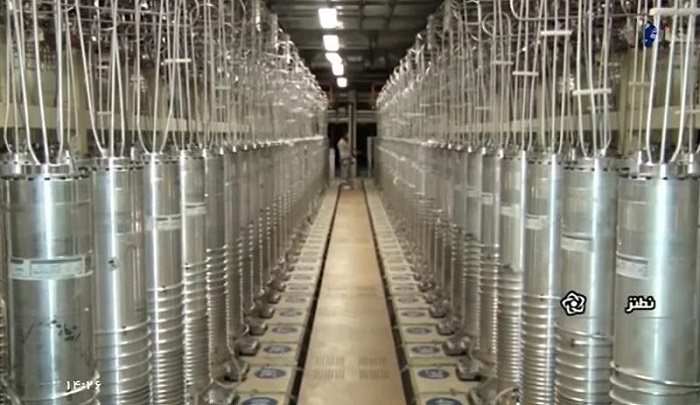Australia/Israel Review
Absent “snapback”, Israel is the last hope on a nuclear Iran
Mar 28, 2023 | Richard Goldberg

In February, Israeli Prime Minister Binyamin Netanyahu declared that Europe “identifies more with the Israeli position” on Iran’s nuclear program, a conclusion he reached after meeting with French President Emmanuel Macron. But as Teheran enriches uranium to near weapons-grade purity and European powers resist triggering the snapback of UN sanctions, a dim reality comes into view that only one country – Israel – has the political will and military capability to prevent the emergence of a nuclear-armed Iran.
The issue of “snapback” is a complicated one, but essential to better understand the bleak reality Israel now faces. Snapback is the name for a mechanism that can be used to restore all international restrictions and sanctions on Iran that were lifted by the UN Security Council alongside the 2015 Joint Comprehensive Plan of Action (“the nuclear deal”). UN Security Council Resolution 2231 replaced all prior resolutions on Iran – removing the international demand that Iran halt all enrichment activities, striking the outright UN prohibition on Iranian ballistic missile testing, and establishing a series of expiration dates on other key international restrictions.
In 2020, the UN conventional arms embargo on Iran expired. This October, a missile embargo on Iran will expire, despite Teheran’s provision of drones – and potential future transfer of missiles – to Russia to attack Ukraine. Nuclear restrictions sunset soon after, eventually legitimising Iran’s production of weapons-grade enriched uranium and perfection of missile systems capable of delivering nuclear weapons.
But UNSCR 2231 came with one condition: If Iran ever violated its own commitments under the nuclear deal, any party to the agreement could notify the Security Council and restore all prior sanctions and restrictions in 30 days. This process is called “snapback”, and France – like the United States, the United Kingdom, and Germany – has the individual power and prerogative to trigger it.
In January 2020, after Iran began producing low-enriched uranium at its underground Fordow nuclear site, the so-called “E3” of Paris, London, and Berlin initiated the nuclear deal’s dispute process – a preliminary step to snapback, aimed at bringing Iran back into compliance with its commitments. But as 2020 dragged on and public polls indicated Donald Trump would likely lose re-election, Europe opted to keep the deal alive in hopes that Joe Biden’s pledge to rejoin the pact would induce improved Iranian behaviour.
Once it was clear that Biden would be president, rather than reward Europe’s decision to maintain the nuclear deal’s sunsets, Iran began a two-year undeterred push toward nuclear threshold status.
In January 2021, Iran began enriching uranium to 20% purity – the threshold for highly enriched uranium – at its Natanz nuclear facility. Rather than continue his predecessor’s maximum pressure campaign, President Biden pulled back economic pressure and offered to lift US sanctions if Iran returned to compliance with the nuclear deal. Teheran responded by producing 60% enriched uranium at Natanz – then 20% at Fordow, and finally 60% at Fordow by November. At any point, the E3 could have moved forward with the snapback process it started in January 2020, but no party did. Instead, Iran was allowed to amass larger and larger stockpiles of high and low-enriched uranium – enough to produce “several” weapons, according to the UN’s top nuclear watchdog.
Neither the E3 nor Washington seemed disturbed enough by Iran’s decision to suspend international monitoring at a key advanced centrifuge manufacturing plant to trigger the snapback. Nor has the E3 felt the need to trigger the snapback in the face of Iran’s refusal over the last four years to answer basic questions about why man-altered uranium particles were discovered at three sites previously unknown and still undeclared to the International Atomic Energy Agency (IAEA) – a fundamental breach of Iran’s obligations under the Nuclear Non-Proliferation Treaty, let alone the nuclear deal.
If the recent confirmation that Iran has enriched uranium to just under the 90% weapons-grade threshold – a line many analysts long believed to be a trigger for military action – does not force Paris, Berlin, or London to complete the UN snapback process – a political action – Jerusalem should finally accept the reality that Israel will need to confront this threat on its own terms, in its own ways, and on its own timelines. There is no cavalry coming from Paris or any other Western capital.
Teheran knows the difference between deterrence and deference, between pressure and platitude. Today, it fears only one country: Israel. This tiny democracy of nine million people will soon be forced to act in a manner that preserves freedom and prosperity for every American and European threatened by the prospect of a nuclear-armed Iran. The best Netanyahu can hope for is a “thank you” when the job is done.






